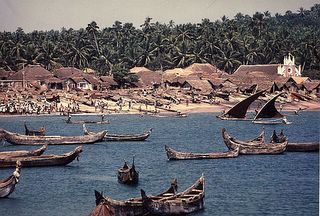 Trivandrum by Carl Parkes
Trivandrum by Carl ParkesWorldHum is one of the better travel websites on the net, due to the hard work of Jim Benning and his co-conspirator Mike who have been producing and publishing the best travelogues for almost 5 years -- ancient in contemporary internet terms. And after years of struggling under an outdated website model, they have dumped the old model and gone modern with a new look and added features. RSS! Wow! Search! Wow!
All this is good news, plus they have enticed major travel writers to their fold, such as Rolfie and others to pen special sidebars. The new format is way, way better than their old layout that left the monthly feature dead center and pretty much killed the energy. Now it's divided into three parts. On the left is a monthly update with stuff from all your old friends, including Rolf and other guys about responsible travel and the plight of elephants, not to mention book reviews.
The middle section on the revised blog will certainly be the most interesting and the most challenging for Jim and Crew, since they are going to try and maintain a daily blog with news about travel and the travel writing industry. Good luck, guys. This is a difficult endeavor and the pay is pretty low when calculated on a per-hour basis. I was going to say shit, but changed my mind. Nobody sticks to a volunteer program with no rewards. Doesn't happen. But then perhaps Jim and company can figure out a solution. I certainly can't.
Finally, the right column is the advertising page, where the hopes and dreams of Jim and Friends will ultimately lie. Will they make enough money to keep them inspired and keep them updating this website? God knows. They now have the enthusiasm and energy to crank out great stories and great links for perhaps the next 6 months, but after that, anyone's guess. In the meantime, it's a wonderful event and everyone should be checking World Hum for insight, humor, and revelations.
World Hum version 2.0 has launched, and if you haven't taken a look in a few days, we've just posted several new stories.
First, the new design: As many of you know, we started the site in May 2001 with four stories, no photos and no long-term plan beyond publishing travel narratives that we liked. In the last four years the site has grown tremendously, but its antiquated design and mechanics were hindering its growth -- we couldn't even manage our growing list of newsletter subscribers. World Hum needed a makeover.
With the redesign, we've combined the best of the old site with a host of new features. The dispatches, interviews and weblog that have long been the heart and soul of the site remain. To these, we've added five new sections: Ask Rolf, Books, Speaker's Corner, How To and Greetings From.
Some familiar names will pop up more often. We can't do this alone, so we've asked a few of our favorite writers to become contributing editors.
Here's a rundown of the new features as well as the latest stories:
Dispatches
Just posted: Porter Shreve, whose novel "The Obituary Writer" was a New York Times Notable Book, evokes a harrowing bus journey in the Middle East. Previously, Jason Wilson, series editor of "The Best American Travel Writing" anthologies, whistled at the aurora borealis in Iceland.
Q&A
The latest: An interview with Joel Henry, the dean of "Experimental Travel." Previously, Andrew Steves, son of travel writer Rick Steves, fielded questions before embarking on his first solo trip to Europe.
Ask Rolf
Vagabond travel writer Rolf Potts answers your questions about travel, doling out hard-won wisdom from more than a decade on the road in Asia and beyond. Potts is a former Salon.com travel columnist who wrote, "Vagabonding: An Uncommon Guide to the Art of Long-Term World Travel."
Books
Travel books don't get enough press, so we've created the Books section to feature original reviews and other book-related features. Frank Bures, whose World Hum story, "Test Day," was featured in "The Best American Travel Writing 2004," will oversee the section. In the first installment, he reviews Emma Larkin's "Finding George Orwell in Burma." Coming soon: a look at Paul Theroux's new novel.
Speaker's Corner
Speaker's Corner gives writers a chance to rant or rave about a topic close to their hearts. Just posted: Michael Yessis celebrates the 25th anniversary of the classic travel film, "Airplane!" In the first installment, travel writer and Ethical Traveler Executive Director Jeff Greenwald lamented what has become of Burma, the Southeast Asian nation Western adventurers once dubbed the "Golden Land."
How To
Learn how to dive deep into another culture. Just posted: Contributing editor Terry Ward, whose travel stories have appeared in The Washington Post and the Los Angeles Times Magazine, explains just how to clean up at a Moroccan hammam. Last time, she parsed the subtleties of kissing hello in France -- not an easy feat.
Greetings From
Postcards and hand-written letters home have given way in the Internet Age to mass e-mails. The best of them convey powerful raw emotion and vivid impressions. In Greetings From, we'll feature some of the most compelling e-mails in their original uncensored form. Now up: a letter from London, pounded out shortly after the recent bombings.
In addition, we've brought World Hum's electronic guts into the 21st century. You'll find a search engine, a feature some of you have been requesting for years; RSS Feed; weblog categories for special interests; and the World Hum Store, where you can find books written and edited by World Hum contributors.
To those of you who helped make this possible with your financial contributions to the site, thank you once again for your support. It has meant a lot to us.
Finally, we're accepting advertisements for the first time. We want to build World Hum into a site that can survive for years to come. Please support the sponsors. They're helping to support us.
We hope you like the new site. Please drop us a note and let us know what you think.
The world is humming. Are you listening?
The Editors,
Jim and Mike
worldhum.com
WorldHum













